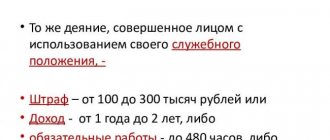The measure of liability for car theft is regulated by Article 166 of the Criminal Code of the Russian Federation. According to it, criminal punishment for this criminal act begins from the age of fourteen.
In this article we will answer the following questions posed: what is considered car theft? What measure of liability is provided for it in accordance with Article 166? What are the features of bringing minors to justice? Read on.
What is considered vehicle theft?
The measure of liability for car theft is regulated by Article 166 of the Criminal Code of the Russian Federation. According to it, theft means the illegal taking of a vehicle.
Read about the procedure for theft here.
According to statistics, most often car theft is committed by minors who are guided by hooligan motives.
According to the same article, criminal punishment for this criminal act begins from the age of fourteen, however, most often it has mitigating circumstances.
Read how to file a police report about a stolen car here.
Read about the penalties provided for car theft in the next section.
Procedure for car theft by a minor
If your child has committed theft of a vehicle and his actions are qualified under the first part of this article, then in order to protect the child from criminal liability, you should, if possible, try to reconcile with the injured person and compensate him for the damage caused.
. Such reconciliation is possible both at the investigation stage, in such a case the criminal case is terminated due to reconciliation, and at the trial stage.
If you become a victim of this crime, you must contact the police with a statement regarding the crime. When the guilty person is identified, you can try to reconcile if the minor or his parents compensate for the damage caused.
Important! In any case, if this is the child’s first crime, then it is necessary to be more lenient, since in adolescence many people make mistakes and it is important not to ruin the child’s life.
In this article, we examined the amount of punishment for theft of a vehicle by a person under 18 years of age, the procedure for action if your car was stolen by schoolchildren or your child committed this crime.
ATTENTION!
Due to recent changes in legislation, the information in this article may be out of date!
Our lawyer will advise you free of charge - write in the form below.
- lawyer
Penalties
Before moving on to the specifics of bringing minors to justice, we will consider the general penalties provided for the theft of a motor vehicle. Thus, according to Part 1 of Article 166 of the Criminal Code of the Russian Federation, a person who has committed theft of a motor vehicle faces the following sanctions:
- Fine up to one hundred twenty thousand rubles;
- Fine in the amount of annual earnings;
- Restriction of freedom for up to three years;
- Forced labor for up to five years;
- Administrative arrest for up to six months;
- Imprisonment for us is up to five years;
If the theft of a car was committed by several persons in conspiracy with the use of violence against its owner, the measure of liability is determined by Part 2 of the Criminal Code of the Russian Federation:
- Fine up to two hundred thousand rubles;
- A fine in the amount of one and a half years' earnings;
- Forced labor for up to five years;
- Imprisonment for us is up to seven years;
If a crime was committed by several persons in conspiracy to cause serious damage to the owner of the vehicle, then, in accordance with Part 3 of Article 3 of the Criminal Code of the Russian Federation, the responsible persons face imprisonment for a term of up to ten years.
Read what to do if your car is stolen and they demand ransom here.
If the theft was accompanied by violent actions that created a threat to the life of the owner of the vehicle, then, in accordance with Part 4 of Article 3 of the Criminal Code of the Russian Federation, the measure of liability will be imprisonment for a term of up to twelve years.
Read about the specifics of penalties for theft for minors in the next section.
Differences between types of theft
A crime related to vehicle theft is classified depending on the ultimate purpose of the criminal act. Theft for the purpose of theft involves obtaining a certain material benefit from the fact of theft. The Criminal Code provides for Article 158 for car theft for the purpose of theft. The concept and signs of theft are discussed in the article.
If the offense is committed, for example, for the purpose of revenge or out of hooligan motives, and is not intended to obtain benefits, then such an offense falls under Article 166 of the Criminal Code of the Russian Federation. Despite the fact that both of these crimes are committed against someone else’s property, theft of a vehicle is not considered theft under the Criminal Code of the Russian Federation.
Let's analyze the main differences between the types of theft according to the fundamental characteristics of the crime using a summary table.
Main features of hijacking hijacking with theft
| Purpose of the offense | temporary possession of a vehicle | obtaining benefits from the sale of a vehicle or its parts, assemblies and assemblies |
| Preparing for a crime | most often a spontaneous action | planned and thoughtful course of action |
| Age of the offender | mainly teenagers and citizens under 20 years of age | from 18 years and older |
| Fact of a crime | immediately after the vehicle is set in motion | after the theft, stage 2 begins: selling the car or its spare parts |
| Selecting the subject of the crime | As a rule, the brand and cost of the vehicle does not matter | the vehicle from which you can get the greatest benefit is selected |
Theft of a vehicle without theft purpose
Every crime implies the presence of:
- subject of a criminal act,
- subject
- subjective and objective aspects of the offense.
The subject of this crime is a vehicle. The legislation states that this is a vehicle that can be used to move on land or water:
- cars,
- boats and motor boats,
- motorcycles,
- tractors,
- other vehicles equipped with an internal combustion engine or an engine powered by electricity.
It is worth noting: theft of a bicycle, rowing boat, canoe, horse-drawn cart, or trailer does not fall under the jurisdiction of Art. 166 of the Criminal Code of the Russian Federation.
The subject of the theft is a legally capable citizen, 14 years of age or older.
The objective side of the criminal act is manipulation to illegally take possession of a vehicle and set it in motion. Moreover, if this action is committed by relatives or friends of the owner of the vehicle who have previously used this vehicle, then such an event does not contain the elements of a crime considered by Art. 166 of the Criminal Code.
The subjective side is the presence of thoughts of theft without committing theft of both the vehicle itself and its parts.
The crime is considered committed from the moment the vehicle begins to move, regardless of how it was carried out. The vehicle can move independently (if functional capabilities are available), towed, pushed by hand or transported on another vehicle.
Article 166 of the Criminal Code of the Russian Federation and penalties for theft
The regulatory measures of liability for car theft under Article 166 of the Criminal Code of the Russian Federation provide for:
- Punishment in the form of a fine of up to 120 thousand rubles or imprisonment for up to 5 years for theft.
- For theft committed by a group of people, if there is reason to believe that they were in conspiracy, the punishment is up to 7 years in prison.
- For theft committed by an organized group of persons, or resulting in particularly large harm, the penalty is 10 years in prison.
- For theft, for which threats of physical harm or violent actions were used - up to 12 years in prison.
Full responsibility for a crime begins at the age of 16. But a person who has reached the age of 14 and has committed the theft can also be prosecuted under the article for hooliganism.
In the absence of aggravating circumstances, you can count on the court to impose a minimum sentence. Otherwise, the penalty may be close to the specified upper limits. Aggravating circumstances are:
- Being in a state of alcoholic intoxication during the hijacking. This circumstance makes the crime more socially dangerous, because suggests that the thief was driving the vehicle while drunk. In addition to the punishment for theft, the culprit will also have to pay a fine for failure to comply with traffic rules or may have his driver's license revoked.
- Theft of a vehicle with passengers in it. In addition to theft, the offender also forcibly restricts the freedom of other people (unlawful restriction of freedom is described in the article). If threats were made against passengers during the crime, this further aggravates the guilt. Passengers may also demand payment of moral compensation.
- Damage to the vehicle or its components during theft. The hijacker is obliged to compensate the victim for repair costs and, possibly, compensation for moral damages.
It is worth noting: in addition to imprisonment, the court in each specific case may also impose other types of punishment. This can be compulsory labor for a period of up to 360 hours, correctional labor for a period of up to 1 year, forced labor for a maximum period of 5 years, or arrest for a period of up to 3 months.
However, the court may also take into account mitigating circumstances:
- The defendant's need to provide for minor children and other dependents.
- Voluntary payment of compensation to the injured party.
- No claims from the victim.
- Voluntary admission of guilt.
- No prior criminal or administrative charges.
- Positive characteristics from place of residence, place of work, etc.
- Unsuccessful hijacking attempt.
Watch the video about car theft and the punishment for this offense.
Examples from judicial practice
The following case can serve as an example of the qualification of a criminal case under this article.
18-year-old citizens Ivanov and Petrov decided to joke with their friend, Count. Sidorov, to whom his parents gave him a car. They agreed to steal a car to a neighboring neighborhood. Not finding his car on the spot, gr. Sidrov filed a statement with the police.
A few hours later the car was discovered. Witnesses described the young people who drove the car. As a result, gr. Ivanov and Petrov were detained. The court qualified their actions under Art.
166 of the Criminal Code of the Russian Federation, part 2 - theft without the intent of theft by a group of persons by prior conspiracy and awarded a fine of 150 thousand rubles.
Let's consider 2 more examples from judicial practice of recent years:
- 2 citizens of the Russian Federation, while intoxicated, stole the plaintiff’s car without the intent of theft. During the investigation, it turned out that the citizen who was driving the car when it was stolen had previously been deprived of his driver's license, and was also brought to administrative responsibility for hooliganism. The court also found out that the defendants are not officially employed and each of them has two dependent young children. The court took into account the voluntary compensation by the defendants for the damage caused to the plaintiff, as well as the voluntary admission of guilt and the positive characteristics of the defendants. Based on all the information listed above, the court sentenced the defendants to a minimum fine.
- A citizen of the Russian Federation committed deliberate theft of a car while on probation for a sentence in another case. The defendant voluntarily confessed to the crime. Also, as mitigating circumstances, the court took into account the satisfactory characteristics of the defendant and his state of health, including the presence of HIV infection. As a result of the trial, the defendant was sentenced to 1 year and 9 months in prison.
You can ask questions about vehicle theft in x to the article
What awaits a minor?
According to Article 166, criminal punishment for this criminal act begins from the age of fourteen, however, most often it has mitigating circumstances. For car theft, a minor is expected to:
- Fine (in a non-fixed amount);
Read how to appeal a fine here.
- Compulsory work from forty to one hundred and sixty hours;
- Correctional labor for up to twelve months;
- Imprisonment from two months to two years;
The maximum term of imprisonment for minors under sixteen years of age is no more than six years.
However , in order to bring a minor to justice, one important nuance is required: the juvenile offender must have official income.
In practice, such a punishment as imprisonment is applied to minors only conditionally.
Stole or took a ride? Responsibility of Minors for Vehicle Theft
Stole or took a ride? Liability of Minors
for theft of a vehicle.
When is a car considered stolen?
The theft of a car is considered to have taken place from the moment of departure or movement of the vehicle from the place where it was located.
If some scoundrel got into your car and, under his threats, you went where he wanted, this also qualifies as theft, since in this case the driver is deprived of the opportunity to dispose of the vehicle at his own discretion.
If a person who tried to break the locks and alarm system, start the engine, tried to set the car in motion, but due to circumstances beyond his control he was unable to realize his criminal intent (frightened off, detained), then this qualifies as attempted theft.
Now you know what car theft is. Let's figure out what the punishment will be for committing this crime.
So, car theft is the unlawful taking of it without the purpose of theft, that is, taking the car for a ride. If a car is stolen for the purpose of sale or dismantling for parts, then this will already be classified as theft.
Aggravating circumstances affecting punishment
The article on car theft by minors provides for some aggravating circumstances that enhance the nature of the punishment. If the group theft of a car was pre-planned or resulted in major damage, the prison term for the accused can be up to 10 years. If violent acts were committed in order to take possession of a car, or if the offense involved a threat to the lives of third parties, the accused may face up to 12 years in prison.
Important! Identical crimes committed by a minor or a person over 18 years of age entail different degrees of punishment, since a more lenient sentencing system applies to minors.
Your child stole a car - what to do and what to do?
If your own son stole a car, you need to take the following actions as soon as possible:
- contact the victim as soon as possible and return the car to him;
- fully compensate for material and moral damage caused;
- take a receipt from the victim that he has no claims;
- contact the police, go there with your son and give a confession, in which you indicate all the information regarding the theft, and attach a receipt;
- to appear promptly when called by the investigator and the court;
- ask during the investigation and trial for reconciliation of the parties or mitigation due to the age of the victim’s car thief, compensation for material and moral damage, and active repentance for the crime.
If a teenager stole a car from a close relative, including his parents, you should know that relationship does not exempt you from criminal liability.
If the theft is committed for the first time, by one child without the involvement of other people or physical violence and the absence of major damage, then reconciliation between the parties and the termination of the criminal case is possible between the hijacker and his parents.
The amount of especially large damage is not defined in the legislation ; in each specific case, the court, taking into account the circumstances of the case, decides the issue of especially large damage.








